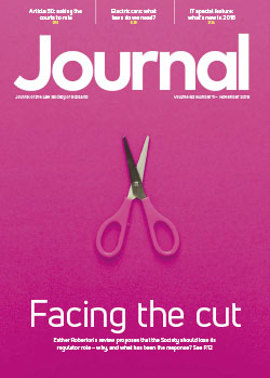Appreciation: Murray Alexander Sinclair
Murray Sinclair was a distinguished public servant and an outstanding lawyer who made a significant contribution to the government of Scotland.
Over the course of a remarkable 30-year career as a government lawyer, Murray served, with professional dedication, four Secretaries of State for Scotland, six First Ministers and nine Lord Advocates.
His legal career in government started in what was then the Office of the Solicitor to the Secretary of State for Scotland in 1988. The young solicitor’s talent was immediately recognised and, uniquely for that time, he was assigned from the outset to a policy advisory post.
Murray advised on criminal justice before becoming an instrumental part of the team that delivered devolution. His immense contribution during that time of constitutional change has been recognised in tributes from across the Scottish legal profession.
In 1999 Murray was promoted to the senior civil service and became head of the division advising on local government, environment, housing and countryside and natural heritage. In 2004 he transferred to head up the Constitution & Parliamentary Secretariat. In that role, Murray led a team combining lawyers and policy civil servants.
Eight years later he was appointed Solicitor to the Scottish Government and head of the Government Legal Service for Scotland. Remarkably, Murray is one of only two people who have held that position in the 20 years since devolution.
The position of the Solicitor to the Scottish Government is a truly significant office within the devolved constitution, and it is a demanding one, which calls for the highest legal expertise and wise judgment, but also for acumen, leadership, sensitivity to the changing parliamentary and political context, understanding of the wider constitutional landscape in the UK and, for the moment at least, the EU, and personal and professional integrity.
After the election of 2007, Murray supported the incoming ministers in the formation of the first post-devolution minority government. He advised them on the Scottish constitution – which suddenly, for understandable reasons, was no longer of interest only to constitutional lawyers.
And later, he was directly involved in the changes effected by the Scotland Acts of 2012 and 2016, as well as in the work which was undertaken in connection with the 2014 referendum on independence.
After the 2016 referendum on the UK’s membership of the European Union, Murray was deeply involved in work to address the consequences of the vote. He knew the impact of constitutional change on the law, on government, and on his staff; and his advocacy laid the groundwork for the changes needed to respond to the unprecedented challenges which that vote presents.
Murray cared deeply about his staff in all parts of the legal directorate. He was generous with his time in speaking with individuals, regardless of grade, about issues which were important to them. Over the last weeks, many have reflected on his personal kindness to them.
Murray attended Dundas Primary School and then Dollar Academy after gaining a bursary. He went on to study law at Christchurch, Oxford, winning the Boulter Prize for law in his first year, an award given to a deserving student as chosen by the tutors.
After Oxford, Murray completed a degree in Scottish law at the University of Edinburgh. His first legal post was a traineeship with Dundas & Wilson before he took his first post as a government lawyer in 1988 at the then Scottish Office.
In 1987, Murray married Aileen, having known her since childhood. They were together for 27 years and along the way had their two children, Cameron and Mhairi.
He was with his current partner, Shirley, for nine years and with her continued to explore his love of travelling, particularly to Paris which they would visit at least once a year.
He was a generous, intelligent, loving man with a great sense of humour. Not only an interesting man, but someone who always showed an interest in others, especially his family.
Murray will be missed most of all by his family – in particular by Shirley, by Mhairi and Cameron, and by Kate, Clare and Beatrice. He will also be missed by many people in the Scottish Government and also across the wider Scottish legal profession who reflect on his life as a distinguished public servant, as an outstanding professional lawyer, and as a man who over his truly remarkable professional career contributed so much to the law and to the government of his country.
In this issue
- Salaried but not employed
- Brussels and Brexit: the end of the beginning
- The art of rectification
- Affidavits in family actions: the new practice
- Overseas but under the law
- Share schemes: the key to unlocking business success?
- Reading for pleasure
- Opinion: Laura Connor
- Book reviews
- Profile: Waqqas Ashraf
- President's column
- Ayr-Zetland: the tour continues
- People on the move
- Heading for a split?
- Brexit: a role for judicial review
- Human rights: closing the gap
- Switching on to electric cars
- Excellence in many guises
- Legal IT: from potential to progress
- How to get law firm stakeholders to invest in legal technology
- End of the road
- Deficiencies of process v disability discrimination
- Family lawyers and the sleuth client
- Sending the right message
- Pension transfers: protecting people from themselves
- Scottish Solicitors' Discipline Tribunal
- Missives: the third way
- Variety in squeezed times
- Public policy highlights
- New year, new plan
- Mentoring scheme moves up a level
- Ask Ash
- (Re)Setting the clock – the breeze that caused a storm*
- Paralegal pointers
- The quest for innovation
- Appreciation: Murray Alexander Sinclair






